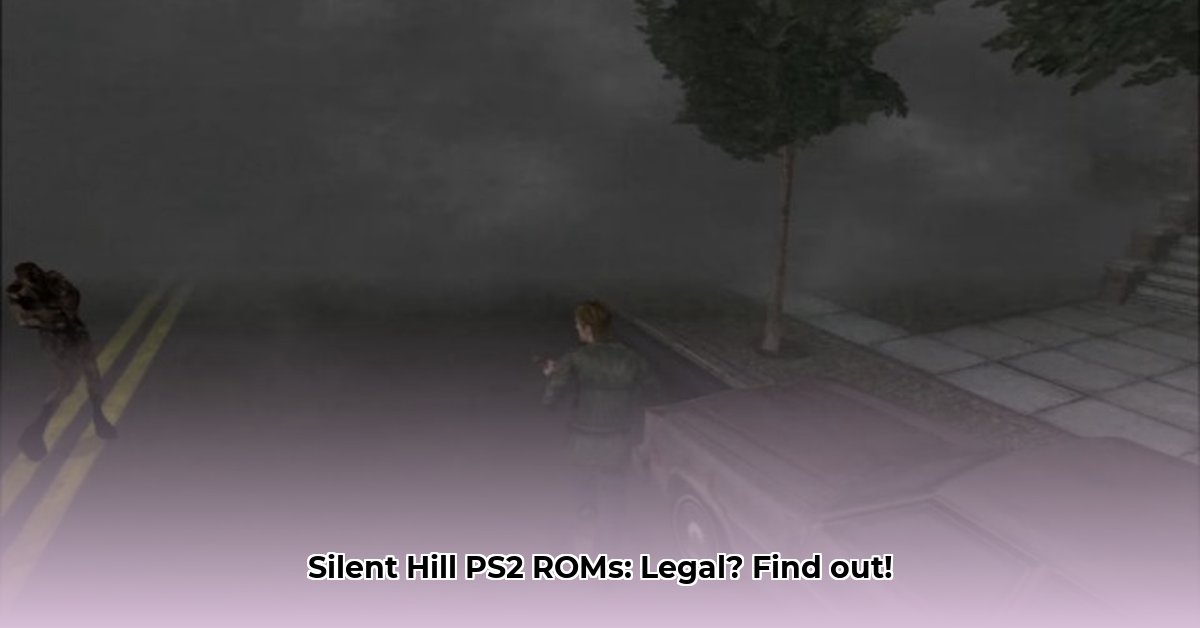
ROMs PS2 Silent Hill: Navigating the Legal and Ethical Landscape
The enduring popularity of Konami's Silent Hill 2 has led many gamers to seek out PlayStation 2 (PS2) ROMs (Read-Only Memory, a digital copy of a game disc) of the title, often through websites like CoolROM. However, accessing these ROMs presents a complex web of legal and ethical considerations. This deep dive explores the history, legality, and future of Silent Hill 2 ROMs, offering actionable insights for gamers, developers, and preservationists alike.
The Allure of Nostalgia: A Digital Time Capsule
Websites like CoolROM offer a tempting proposition: access to a vast library of classic video games, many of which are no longer commercially available. For Silent Hill 2, a critically acclaimed title known for its psychological horror and innovative gameplay, the allure of revisiting this gaming milestone is strong. This digital preservation, however, raises crucial questions about copyright infringement and ethical responsibilities. Is preserving gaming history worth the legal and moral risks?
Deconstructing the Legal Framework: Copyright and Fair Use
The legal status of ROMs is far from straightforward. While some argue that archiving obsolete games for preservation purposes constitutes "fair use," this is a complex legal concept that doesn't automatically apply to ROMs of copyrighted material. Downloading and playing a ROM of Silent Hill 2, or any game you don't own, is generally considered copyright infringement, potentially leading to legal action like DMCA (Digital Millennium Copyright Act) takedown notices. The quality of ROMs found online is also inconsistent, with some being corrupted or modified versions of the original game.
The Ethical Tightrope: Balancing Preservation and Profit
Aside from the legal repercussions, downloading ROMs without authorization presents significant ethical concerns. Does the desire to preserve gaming history justify circumventing the rights of copyright holders? While arguments for preservation are valid, it’s crucial to acknowledge that unauthorized access to copyrighted material directly impacts the financial well-being of game developers, potentially hindering the creation of future projects.
Stakeholders and Their Actions: A Multifaceted Approach
The challenge of balancing game preservation with copyright protection requires a collaborative effort from all stakeholders.
| Stakeholder | Short-Term Actions | Long-Term Actions |
|---|---|---|
| Preservation Communities | Advocate for clearer legal frameworks around digital preservation; develop robust verification methods for ROM accuracy. | Establish community-run archives with verified ROMs; promote open dialogue with copyright holders to explore collaborative preservation initiatives. |
| Copyright Holders (e.g., Konami) | Assess legal options while considering the cultural significance of game preservation; explore strategies for controlled ROM distribution. | Investigate models for licensed emulation or the release of source code for archiving purposes, allowing for legal and ethical ROM access. |
| Emulator Developers | Enhance emulator compatibility and performance across different game versions and consoles. | Continue refining emulation technology, providing support for future games and platforms. |
| Gamers | Prioritize ethical and legal access to games; respect copyright laws; support legitimate game preservation initiatives. | Advocate for fair use and responsible digital rights; contribute financially to preservation efforts. |
A Glimpse into the Future: Bridging the Gap
How can we effectively preserve video games for future generations? The emergence of licensed emulators offering verified ROMs of classic titles, like a potential Silent Hill 2 legal emulation service, could be a pivotal step. These initiatives require collaboration between copyright holders, preservation communities, and emulator developers to ensure both legal compliance and accessibility. Open discussions and innovative solutions are needed to navigate this complex issue.
How to Legally Preserve Rare Video Game ROMs: A Silent Hill 2 Case Study
Key Takeaways:
- The legality of ROMs is contingent upon ownership and copyright status. Downloading games you don't own is illegal. Emulators themselves are generally legal; the legality rests with ROM acquisition.
- Fair use is a complex legal concept that varies by jurisdiction and doesn't always protect ROM acquisition.
- Public domain games and developer-released ROMs are the only legally safe options.
- Responsible acquisition and ethical usage are key to legal ROM preservation.
The Silent Hill 2 Conundrum: Respecting Legacy & Law
Silent Hill 2's enduring legacy highlights the tension between accessing gaming history and respecting copyright. While obtaining ROMs may feel like preserving a cultural artifact, the legal realities must be acknowledged.
Navigating the Legal Landscape of ROMs: Understanding the Nuances
ROMs are digital copies of game data. Emulators are software that allows you to play ROMs. While emulators are generally legal, obtaining and playing ROMs of games you do not own is copyright infringement.
Legal avenues for preservation include: acquiring games legally and creating backups only for personal use (this presents legal gray areas depending on jurisdiction); utilizing ROMs of games in the public domain; or specifically seeking out official releases of ROMs by developers. The concept of "abandonware" adds ambiguity; despite a game's lack of active support, copyright protection persists.
Actionable Steps Towards Ethical Preservation
- Purchase legally: Obtain physical copies of games, then create backups only if this is legal in your area. Carefully research the legal aspects of game backups in your region. (Efficacy: high, dependent on jurisdiction)
- Seek official releases: Check for developer-sanctioned ROM releases. (Efficacy: high, but availability is limited)
- Focus on public domain titles: Choose games with expired copyrights. (Efficacy: high, limited selection)
- Support preservation initiatives: Contribute to organizations dedicated to archiving video games. (Efficacy: moderate, indirect impact on individual ROM access)
The Future of Retro Game Preservation: A Collaborative Pursuit
The legal and technological landscape will continue to evolve. Collaboration between game developers, legal experts, and preservationists is crucial to establish clear guidelines for responsible archiving and access to gaming history. Supporting initiatives that promote fair use and ethical preservation remains essential.